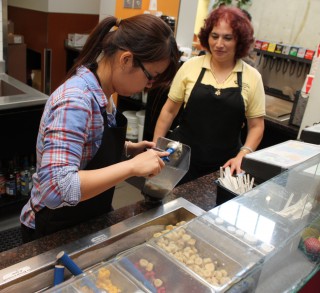This content was published: August 11, 2011. Phone numbers, email addresses, and other information may have changed.
PCC brokers a smoothie deal with OSU, food partners
Photos and story by James Hill
It’s not always smooth sailing in the collegiate food and beverage business.
Two years ago, Portland Community College’s Food and Vending Services Manager Dianna Benting had a big problem with her smoothie provider at the college.

Food service worker Myhanh Luu, who takes business courses at the Sylvania Campus, serves up a delicious smoothie.
“We noticed that every ingredient on the smoothie concept we had, all those particular proprietary ingredients, listed high fructose corn syrup as the first ingredient,” Benting said. “We were so locked into the other company’s recipes. We couldn’t alternate or customize for the customers. And, it was expensive. As we looked at it, Pacific Natural Foods had brought over their natural smoothie base for us to sample and I got to thinking that we can use it instead.”
Benting found out she wasn’t alone in being unhappy with the high amounts of sugar in smoothie products of their school, or the lack of wiggle room in developing new smoothie combinations. Oregon State University had a similar issue with the same smoothie supplier. So, Benting teamed up with Rich Turnbull, the associate director of University Housing and Dining Services at OSU, and started the ball rolling on a partnership that highlights how colleges can change what students eat on their campuses for the better.
The broker for Pacific Natural, Tom Allenby with food service broker Morton and Associates, dealt with both of their concerns. He worked with the schools to develop a concept called “Chill” that links food companies Pacific Natural, Ocean Spray, Dannon and Dole to provide all natural and all local ingredients (except for the tropical fruit, of course) for the Chill Concept. The manufacturers chipped in some money and Allenby hired a marketing firm in Chicago to do market and trademark research, and product and logo design.
“This is breaking new ground,” Allenby said of the concept. “It’s the first time multiple manufacturers in the food service industry got together and put together something like this. It was designed for the college and university marketplace. It has all of the positives that the end user needs to have a great food product – it’s clean, natural and has good fiber. I’m pretty proud of it.”
As a result of his efforts, it’s been a smooth transition from the old smoothie concept to the new Chill Concept, which started at PCC last fall. Today, demand is high at PCC where the Chill Concept of 18 different smoothies is offered at the Sylvania Campus and the Southeast Center. When the bond program builds out at the Rock Creek and Cascade campuses, the smoothies will be offered at those places as well. At OSU, the school reports smoothie sales are up 8 percent and costs are down 3 percent.
“Students are very appreciative of the idea that all of the ingredients are all natural,” Benting said. “They’re really happy to see that the companies were local, too. The smoothie base is made in Tualatin. It’s organic and we use Pacific Natural’s soymilk for coffee. Ocean Spray uses cranberries and apples from Washington.”
The concept has spread to other colleges. Now, you can find the Chill Concept at the University of Portland, George Fox University and Chemeketa Community College. The concept is open for any college and university to use and Benting thinks the concept will catch on nationally after a national food service publication profiled the concept.
“It costs schools nothing to use,” she said. “Your only agreement is that you make sure you use the four manufactures that paid for the concept. It’s designed for colleges and universities. They can come up with their own formulas and recipes. It’s a great concept.”

